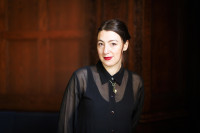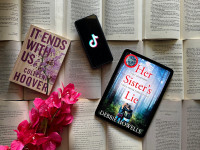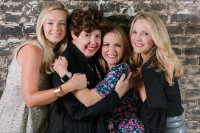
Inside the writers’ room
artshub.com.au – Friday November 1, 2024

Getting a toe in the door of the writers' room can be challenging, but these successful writers share some tips.
A writers’ room is something like the nerve centre of a scripted drama or comedy, a place where some combination of writers, producers, editors and developers come together to brainstorm the overall arc of a series and flesh out the plot of each episode.
Many playwrights, comedians and filmmakers aspire to break into the world of writers’ room, but they present challenges in adapting to someone else’s voice and working in a newly collaborative way. They can also be mysterious to the uninitiated and are notoriously tricky to break into.
Here ArtsHub talks to four writers who have worked in a range of rooms, and who have taken different paths to these writing gigs, to discover how they found their way in and what they’ve learned.

‘Dark things can be quite illuminating’
news.harvard.edu – Friday November 1, 2024

Horror writing instructor defends prestige of ‘genre that bites back’
Self-described “former spooky kid” Katie Kohn teaches the class “Advanced Fiction: Writing Horror” at Harvard Extension School. The Gazette interviewed Kohn, a doctoral candidate in the Art, Film and Visual Studies program, about people’s fascination with scary stories, the difference between bad and good horror, and what the genre can teach us about ourselves.
What makes horror stories different from other stories?
All stories are rooted in conflict; they promise us that things will go wrong. But horror stories do two things that I truly think are unique. For one, horror tends to destabilize the very binaries out of which other stories source their tension. It’s not just about playing good against evil, the familiar against the strange. Horror complicates. For instance, we use the term “uncanny” to describe a breakdown between something we recognize and something we don’t. It’s neither simply familiar nor strange; it’s somehow both. Horror loves to take us to these places where nothing is certain, where it feels like the rug is always about to come out from under us.
That’s the other effect horror stories promise: uncertainty to the very end. Horror asks us to accept the prospect that things might not turn out well. If other stories overcome challenges or resolve tensions, this one might be as raw and as confrontational as life can be, without curation or niceties. For instance, there are points at which we no longer feel safe reading a horror story or watching a horror film, that moment when we want to look over our shoulder or check under the bed. All stories ask that we suspend our disbelief. Horror exploits that basic instinct to give ourselves over to stories. Horror is a genre that bites back.

Who’s Really Writing Celebrity Novels?
vulture.com – Friday November 1, 2024

The writers and agents working behind the scenes tell us how it actually works.
Celebrity memoirs are a dime a dozen, but there’s a smaller cohort of stars who have tried to add “novelist” to their résumés. This includes Kylie and Kendall Jenner, who wrote the 2014 YA novel Rebels: City of Indra; Carrie Fisher, author of the deeply autobiographical Postcards From the Edge; and Tyra Banks, whose 569-page Modelland is about a girl named Tookie De La Crème. In early October, Reese Witherspoon announced she was collaborating with the best-selling thriller author Harlan Coben. But what does it mean when a celebrity decides to write fiction?
Here, the writers and agents working behind the scenes on similar books tell us how it actually works.

Suspense (A state or condition of mental uncertainty or excitement…)
By G. Miki Hayden
Instructor at Writer's Digest University online and private writing coach
firstwriter.com – Thursday October 31, 2024

Suspense, as a noun, may sound vague, but as an artful expression in film, on stage, or in novels, suspense is a fairly specific ingredient. Suspense can dominate the genre being presented throughout, or suspense can come to the fore for a scene or a moment at the height of the story, and then resolve. Suspense can be sprinkled in like a condiment, or it can relentlessly keep an audience on the edge of their seats for the entire piece.
No matter how suspense is used, in a mystery, ghost or horror story, in an adventure, or as part of a futuristic end-of-the-world drama, this chilling emotion will pay off its creator well, in dollars and in fame. However, real suspense can be hard to produce.
On stage or in film, suspense can be urged along by music, spooky shadows on the set, or an actor’s makeup; yet on the page, suspense can only be produced by… words. But ,as we writers all must know, the word is mightier than any other means of affecting human emotion. And thus words will certainly do.
So, how do we keep the reader in a state of mental uncertainty or excitement? By sleight of hand, of course, by suggestion, by both the usual means and the unusual.

Agony Editor: How to tell a fellow writer it’s time to move on
quillandquire.com – Wednesday October 30, 2024

Dear Agony Editor,
A guy in my writing group has been working on a short story for three years. Every time it’s his turn to submit work for the group to critique, it’s the same story with only minor adjustments. I’ve said everything I have to say, and truthfully, the story isn’t working. If I have to read it one more time, I’ll scream. I want to tell him to move on, but how do I do it delicately?
Signed,
Rinse and Repeat

Seven of the best UK retreats for aspiring writers
thetimes.com – Tuesday October 29, 2024

These weekends away will get your creative juices flowing with journaling workshops, special guests and, of course, desks with stirring views
Some say everyone has a novel in them — and the recent boom in self-published books suggests it could be true. According to the website Wordsrated, 300 million self-published books are sold each year, while the newsletter platform Substack has reported a 50 per cent growth in new writers over the past 12 months. But whether you’re writing for yourself or you have a three-book publishing deal, the hardest part of the process is often getting started. We’ve found seven retreats to help you to put pen to paper, each somewhere lovely.

When bestsellers fail to deliver: Don’t fall for the promises of book tok reviews
tribune.com.pk – Saturday October 26, 2024

Every few weeks, I head on over to our local library and come back home with as many books as my backpack can carry. Where others dream of holidaying in the Bahamas (or Switzerland or Dubai or what have you), my dreams are just as ambitious: I yearn to sink into the sofa with a Really Good Book.
You would think, with all the untold promises of book tok and the liberal abundance of five-star reviews on Goodreads, that successfully nagging a Really Good Book would be as easy as buying bread. Please bury this foolish pipe dream immediately. If my library haunts have taught me anything, it is that it is easier to book and pay for that Bahamas holiday, or even a weekend away on Mars, than it is to find a good book in the league of, say, John Grisham of the late nineties. Or JK Rowling during the Harry Potter days. Or even the Hardy Boys. Or, if we are open to facing dead and buried memories, Sweet Valley High.
Which neatly segues us into our burning issue of the day: the mediocrity of modern books. Why, pray, is the psychological thriller and Sunday Times bestseller that promised me a “haunting” and “dazzling” read less interesting than the back of a cereal box? In order to answer this grave and burning question, I invite you all to dissect Exhibit A, aforementioned haunting and dazzling thriller Her Sister's Lie by Debbie Howells. I was forced to endure this book after an ill-fated library expedition comprising five other uninspiring reads, and I see no good reason you, too, should not suffer.

Has publishing abandoned teen boys?
thebookseller.com – Sunday October 20, 2024

Teen boys can be tempted back to books, but the industry needs to refocus its efforts.
Recently, I asked social media a question—are we ready to have the ‘there is nothing out there for teen boy readers’ discussion yet? What transpired on that thread was authors, booksellers, librarians, readers and parents all chiming in with fascinating responses. By far the most common was that there is a dearth of books for boys in the post-Middle Grade space.
Now, MG is filled with wonderful books for boys, but Teen and YA unquestionably lean towards girl readers. During my school talks all over this country, I’ve heard boys say: "I can never find a book I like" or, "Yours is the first book I’ve read in ages". You might think hearing that is nice, but more than anything it’s frustrating. Because it means publishing isn’t serving them in the way they deserve. And if this industry isn’t serving its young readers, particularly at a time when you either capture them for life or lose them forever, then change is desperately needed.
A crucial point made on the thread was that all Teen publishing is underserved. I agree, and there seems to be two key reasons for this. The first is that there is no industry-accepted term for children 13-16. ’Teen’ is a term that is sometimes used, but it’s by no means universally acknowledged. While some online retailers have a Teen and YA category, most brick-and-mortar bookshops have either a Teen or YA section, not both. Which means that a 15-year-old walking into a bookshop must make their way through countless books that are not written with them in mind before they find one that is. This is particularly true for teen boys, who are increasingly unlikely to find books for them on tables or face-out on shelves. Booksellers are well aware of this, and I’m convinced that it’s only with their knowledge and expertise that that boy would walk away with a book that is for him.

Lara Pawson: “I like to write with rules. It pushes my mind into strange places”
newstatesman.com – Sunday October 20, 2024

The Goldsmiths Prize-shortlisted author on making art from objects, and what civil wars taught her about human nature.
Lara Pawson was born in London in 1968 and studied politics at the School of Oriental and African Studies. Between 1996 and 2007, she worked as a journalist, mainly for the BBC World Service. She lived in Angola, Ivory Coast, Mali and Ghana, and travelled throughout Africa, before returning to London, where she now lives. Her first book In the Name of the People: Angola’s Forgotten Massacre was published in 2014, and her experiences as a reporter covering civil wars in Angola and Ivory Coast informed her “fragmentary memoir” This Is the Place to Be (2016).
Pawson’s third book, Spent Light – another fragmentary work – is a book of objects. From a toaster that recalls a story of horrifying violence heard on a bus ride in Andalucía to a brass door handle that retains the spirit of the east London ironmonger who made it, everything that meets the narrator’s eye connects to a personal memory or historical event, in a chain of shocking, funny, revelatory associations. “It is impossible to predict,” the Goldsmiths Prize judge Sara Baume wrote, “at the beginning of almost every paragraph of Spent Light, where it will have taken the reader by the end.”

4 Best-Selling Authors Share Their Best Advice for Finally Writing and Selling That Book Swimming Inside Your Head
entrepreneur.com – Saturday October 19, 2024

The hosts of the "Friends & Fiction" web series share hard-earned lessons they've learned living the writer's life.
"The Titanic was sinking so we jumped in the lifeboat and paddled like hell."
That's how New York Times bestselling author Mary Kay Andrews describes the origin of Friends & Fiction, the weekly web series she co-hosts with her best-selling writer pals Kristin Harmel, Kristy Woodson Harvey and Patti Callahan Henry. Every Wednesday night at 7 pm ET, they chat with authors like Jodi Picoult, Kwame Alexander, and Elin Hilderbrand about their latest works, their tips for writers, and the books they've read that shaped their careers.
In 2020, the four friends had their upcoming book tours abruptly canceled due to the pandemic. They hopped on a Zoom happy hour to commiserate over glasses of rosé and began strategizing best how to reach their readers and support independent bookstores while everyone was stuck at home. As the wine flowed, so did the ideas, eventually manifesting in their wildly popular Friends & Fiction YouTube show and podcast, as well as a Facebook community that has more than 240,000 members.
Since its inception, which featured former host Mary Alice Monroe, the show has branched out with live appearances, an online book club, a thriving merch store, and newsletters in the F&F mix. "We thought we were doing this for ourselves and for bookstores, but the community was sitting there waiting," says Patti Callahan Henry. "I'd like to say we had a plan for all of this, but we basically built a rocket ship on the way to the moon."
Entrepreneur caught up with the four show founders to get their best tips for writers and creators hoping to make an impact. (Sadly, no rosé was consumed during the conversation.) While they each have their own unique approach to their craft, two words sum up their advice: just start!
Get the free newsletter | Submit a news item or article | Get Writers' News for your website





